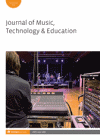
Journal of Music Technology & Education
Scope & Guideline
Unleashing creativity at the intersection of music and tech.
Introduction
Aims and Scopes
- Integration of Technology in Music Education:
The journal emphasizes the incorporation of various technologies into music education, exploring how digital tools can enhance teaching methodologies and learning outcomes. - Innovative Pedagogical Practices:
It aims to provoke and document pedagogical changes in music education, focusing on new frameworks and strategies that facilitate effective learning environments. - Research on Music Performance and Collaboration:
The journal investigates the dynamics of music performance, especially in networked and remote settings, promoting collaborative practices among musicians using technology. - Professional Development for Educators:
A significant focus is on the professional learning and development of music educators, particularly in integrating ICT and music technology into their teaching. - Exploration of Digital Tools and Applications:
The journal promotes research on the use of digital tools, including software applications for music composition, production, and education, highlighting their roles in modern music education.
Trending and Emerging
- Remote and Online Music Education:
There is a growing focus on the challenges and benefits of online music education, especially in the context of the COVID-19 pandemic, which has necessitated new teaching methods and tools. - Synchronous and Asynchronous Learning Frameworks:
Emerging frameworks for facilitating synchronous and asynchronous learning are gaining attention, particularly in how they support group collaboration in music performance. - Virtual Reality in Music Education:
Research exploring the use of virtual reality (VR) for enhancing music training and engagement is on the rise, indicating a trend towards immersive learning experiences. - Interdisciplinary Collaboration:
A significant trend is the exploration of interdisciplinary approaches, where music education intersects with fields like digital technology, media studies, and arts, fostering innovative educational practices. - User-Centered Design in Music Technology:
There is an increasing emphasis on user experience and evaluation in the design of music technology education projects, reflecting a shift towards more inclusive and accessible educational practices.
Declining or Waning
- Traditional Music Education Methods:
There is a noticeable decrease in research focusing on conventional music teaching methods, as the journal pivots towards more innovative, technology-driven approaches. - Physical Music Education Settings:
With the rise of online learning and remote collaboration, studies related to traditional physical classroom settings are becoming less frequent, highlighting a shift to virtual environments. - Narrow Genre-Specific Studies:
Research concentrating solely on specific music genres, such as pop or rock, is becoming less common, as broader interdisciplinary approaches take precedence in understanding music technology's impact.
Similar Journals
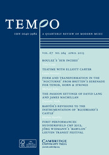
TEMPO
Unveiling the Artistry of Sound and SocietyTEMPO, a renowned journal published by Cambridge University Press, is dedicated to the expansive field of music studies. With its rich history dating back to 1939, the journal has significantly evolved, offering researchers, professionals, and students a platform to explore diverse musical perspectives and innovations. Serving as a vital resource in its category, TEMPO is currently positioned in the Q2 quartile within the field of Music, reflecting its quality and academic influence. Although it operates under a traditional subscription model, its impactful contributions to music scholarship are underscored by its active engagement with contemporary issues in musicology, performance, and education. Researchers can rely on TEMPO for cutting-edge analyses, reviews, and critical discourse that shape the understanding of music in society.
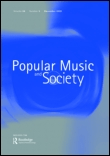
POPULAR MUSIC AND SOCIETY
Revealing the Dialogues Between Music and CulturePOPULAR MUSIC AND SOCIETY, published by Taylor & Francis Ltd, is a leading interdisciplinary journal that explores the intricate relationships between popular music and social dynamics. With an ISSN of 0300-7766 and E-ISSN 1740-1712, this esteemed journal has established a significant presence in the academic community since its inception, covering a broad scope from 1971 and continuing to provide critical insights into contemporary issues in popular music research. Currently classified as Q1 in both Cultural Studies and Music for 2023, it ranks impressively within the top quartile of its fields, showcasing its scholarly impact and relevance. With a Scopus ranking of #42 in Music and #305 in Cultural Studies, POPULAR MUSIC AND SOCIETY serves as an essential platform for researchers, educators, and students to engage with innovative theories and analyses that reflect the evolving cultural landscape. The journal does not currently offer Open Access options, ensuring a focused readership that values in-depth scholarly work. Nestled in the United Kingdom, this publication continues to shape discussions around music's role in society, making it a pivotal resource for those dedicated to understanding the cultural significance of popular music.

Research Studies in Music Education
Catalyzing Critical Discourse in Music EducationResearch Studies in Music Education is a prestigious peer-reviewed journal published by SAGE Publications Ltd, dedicated to advancing the field of music education through innovative research and critical discourse. With an ISSN of 1321-103X and an E-ISSN of 1834-5530, this journal has been a vital resource for academics since its inception in 1993, and continues to serve as a platform for high-quality scholarship aimed at fostering excellence in music education practices worldwide. The journal's impressive Q1 ranking in Music and Q2 in Education for 2023, along with a Scopus rank of #11 out of 180 in the Arts and Humanities category, underscores its significance and influential presence within the academic community. Although it operates under traditional publishing models, readers can expect to encounter a wealth of knowledge that reflects current trends, methodologies, and insights in the realms of music teaching and learning. The journal not only aims to enrich the discourse in music education but also supports researchers, educators, and students in their endeavors to improve musical understanding and pedagogy.

Muzikoloski Zbornik
Innovating the Study of Music Across CulturesMuzikoloski Zbornik is a prominent open-access journal in the field of musicology, published by the esteemed University of Ljubljana Press since 1965. Hailing from Slovenia, this journal has been dedicated to advancing the study of musical heritage, theory, and practice, serving as a vital platform for researchers, professionals, and students alike. With a notable Q2 category ranking in the field of music and a Scopus ranking of 109 out of 180 in Arts and Humanities, Muzikoloski Zbornik showcases high-quality research, fostering discourse and collaboration among scholars globally. The journal embraces a diverse range of topics, from ethnomusicology to music education, ensuring its relevance in an ever-evolving academic landscape. By providing unrestricted access to its content, it champions the dissemination of knowledge and supports the growth of the musicology discipline.

BULLETIN OF THE COUNCIL FOR RESEARCH IN MUSIC EDUCATION
Connecting Research and Practice in Music EducationBULLETIN OF THE COUNCIL FOR RESEARCH IN MUSIC EDUCATION, published by UNIV ILLINOIS PRESS, is a premier scholarly journal dedicated to advancing the field of music education through rigorous research and critical discourse. With an ISSN of 0010-9894 and E-ISSN 2162-7223, this journal plays a significant role in disseminating innovative findings and educational practices, ranking in Q1 for Music and Q2 for Education as of 2023. The journal's esteemed position is further highlighted by its Scopus ranking, placing it in the 80th percentile among music-related publications. Covering a time span from 2002 to 2024, it serves as a vital resource for educators, researchers, and graduate students alike. Although the journal does not currently offer open access, its contributions remain crucial in shaping music education research and practice. The BULLETIN not only inspires scholarly inquiry but also enhances the discourse surrounding effective music education methodologies.

MUSIK UND KIRCHE
Fostering Dialogue on Music's Role in Ecclesiastical LifeMUSIK UND KIRCHE is a distinguished journal published by BARENREITER-VERLAG that offers a scholarly platform for the exploration of the intersections between music and ecclesiastical contexts. With an ISSN of 0027-4771 and an E-ISSN of 2568-3128, this journal is particularly valuable for researchers, practitioners, and students engaged in musicology, religious studies, and cultural history. Although currently not open access, it provides a wealth of peer-reviewed articles that enhance understanding of music's role within church tradition and practice, thereby contributing significantly to the field. Despite fluctuating visibility in academic rankings—standing in Q4 of the 2023 category for Music, based on Scopus evaluations—its historical coverage from 2002 to 2012 and resumed publication since 2020 demonstrates its commitment to fostering rigorous academic discourse. The journal is based in Kassel, Germany, and serves as an essential resource for anyone interested in the dynamic relationship between music and spiritual life.
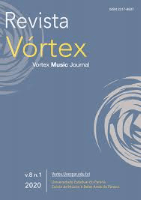
Revista Vortex-Vortex Music Journal
Celebrating the Intersection of Music and AcademiaRevista Vortex-Vortex Music Journal is a premier open-access journal published by the Universidade Estadual do Paraná, specifically through its esteemed Escola de Música & Belas Artes do Paraná. With its ISSN 2317-9937, this journal serves as a critical platform for the dissemination of research and discourse in the field of musicology, music education, and the performing arts. Established in 2014, the journal has been dedicated to fostering scholarly exchange among researchers, practitioners, and students, emphasizing the significance of music as a cultural artifact and academic pursuit. As an open-access publication, it ensures that findings are readily available to a global audience, promoting inclusivity and engagement in the field. Located in Curitiba, Brazil, Revista Vortex invites contributions that explore a diverse range of topics and methodologies, seeking to enhance the understanding of music in contemporary society.

Musica Tecnologia
Advancing Research at the Nexus of Music and TechnologyMusica Tecnologia is an emerging journal that explores the intersection of music and technology, published by FIRENZE UNIV PRESS. With its ISSN 1974-0042 and E-ISSN 1974-0050, the journal serves as a platform for innovative research on the technical aspects of music creation, distribution, and performance. Despite being relatively new, having converged its years from 2020 to 2024, it has already established itself within academic circles, as evidenced by its Q4 ranking in categories such as Computer Science Applications, Electrical and Electronic Engineering, and Music. While the journal does not currently offer Open Access, it provides a crucial avenue for both established scholars and emerging researchers in the arts and technology to disseminate their findings. The potential to influence practices in music technology is significant, making Musica Tecnologia a valuable resource for those looking to stay at the forefront of interdisciplinary research. The journal is located in Florence, Italy, and continues to build its reputation as a meaningful contributor to the fields of music and technology.
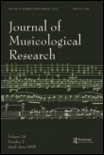
JOURNAL OF MUSICOLOGICAL RESEARCH
Decoding the Language of Music through ResearchJOURNAL OF MUSICOLOGICAL RESEARCH, published by Taylor & Francis Ltd, is an esteemed platform that delves into the field of musicology, contributing to the ongoing dialogue in music research and scholarship since its establishment in 1979. With an ISSN of 0141-1896 and an E-ISSN of 1547-7304, this journal serves as a vital resource for researchers, professionals, and students, offering insights into diverse musicological topics. Although currently categorized in Q4 in Music with Scopus rankings placing it at #110 out of 180 in the Arts and Humanities field, its commitment to excellence and broader discourses in music studies is evident. The journal does not have Open Access options, yet it provides accessible content through reputable academic channels, fostering scholarly exchanges within the community. It aims to publish high-quality research that advances understanding of musical practices and cultural implications, making it a critical resource for those passionate about music and its myriad influences.
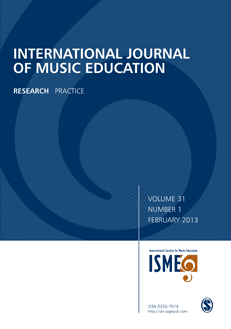
International Journal of Music Education
Advancing the art of music pedagogy globally.The International Journal of Music Education is a premier academic platform published by SAGE Publications Ltd, dedicated to exploring the interdisciplinary intersections of music and education. With its ISSN 0255-7614 and E-ISSN 1744-795X, this esteemed journal has been contributing significantly to the field since 1996 and will continue to do so through 2024, underscoring its commitment to advancing scholarly discourse in music pedagogy. It boasts impressive ranking metrics, including Q1 status in Music and Q2 in Education as of 2023, reflecting its influence within these domains. Ranked #10 out of 180 in Music (94th percentile) and #501 out of 1543 in Education (67th percentile) by Scopus, the journal is acknowledged for its rigorous peer-reviewed articles that address contemporary issues, innovative teaching strategies, and the role of music in learning environments. Although it does not offer open access, researchers, professionals, and students are encouraged to engage with its comprehensive research findings, ensuring the advancement of both music education and the broader arts landscape.